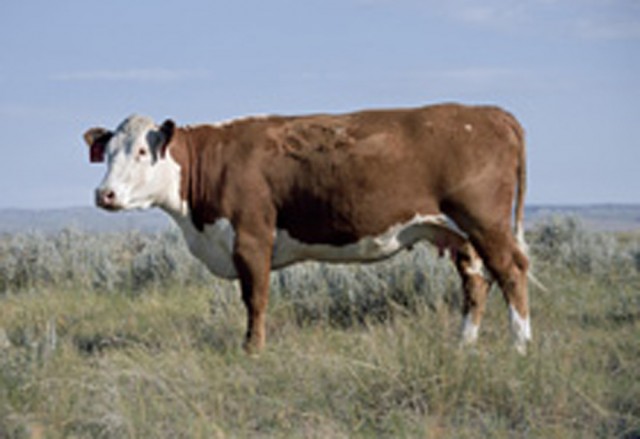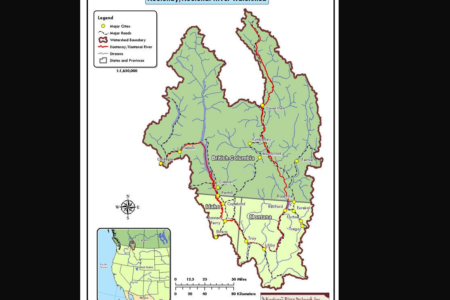Fences reduce water pollution
Tom Marshall, Planet Earth Online
There are plenty of high-tech ideas to tackle pollution, but recent research suggests that some of the biggest gains in keeping our waterways clean could come from a more traditional technology – fences.
Simply fencing off streams and drainage ditches so farm animals can’t deposit manure in and around them could cut levels of faecal pollution dramatically, according to scientists.
This would protect the health of people exposed to river water and help Britain comply with EU rules on water quality.
The researchers created a model of the various factors that lead to faecal pollution — and the harmful bacteria it contains — in rivers. They then used the model to work out how effective different methods aimed at cutting faecal pollution would be, using the Humber river basin as a case study.
Fencing off streams came out ahead by a big margin — the model suggests that by the time water flows out of a region of intensive dairy farming, its E. coli concentrations would be 58.59 per cent lower with fenced streams than without.
As well as keeping animals away, the fences encourage the development of an overgrown riverbank zone which can help filter out faecal matter that’s washed off fields.
This is just one of several possible ways to address the problem.
“But animals having direct access to the water seems to be one of the major risks,” says Danyel Hampson, a PhD student at the University of East Anglia and lead author of the paper, published in Water Research.
“The simple solution of fencing off cattle from rivers is probably one of the most effective ways farmers have of reducing faecal matter contaminating watercourses. From the farmer’s point of view, it is a solution that they can get on and do.”
Alternatives may be less effective, more expensive and more disruptive for farmers. For example, reducing the number of dairy cows in the area, the second-most-effective measure, would only lead to an 11.58 per cent reduction.
The third-most-effective, cutting fertilizer use by 20 per cent to make grass less nutritious so that fewer cows can be kept on it, would cut bacterial rates by less than ten per cent. Both these measures would probably be much more painful for farmers.
Human sewage and farm manure are the two main causes of faecal pollution in the UK. Improvements in sanitation mean the former is rarely a problem unless heavy rain overloads sewers. Manure from livestock, and especially from dairy cows, is now thought to be the main source of pollution.
This endangers people enjoying the water. Illnesses range from nausea and diarrhoea to debilitation and, in extreme cases, death.
Contaminated water also does major economic damage; it’s estimated that exposure to polluted waters, as well as damage to shellfish beds and other productive areas, costs some $12 billion around the world each year.
Current faecal pollution levels also breach the European Water Framework Directive (WFD), with which Britain is obliged to comply. The Bathing Water Directive, part of the wider WFD, imposes controls on pollution, particularly in protected places such as designated bathing areas.
Britain doesn’t have such a culture of spending leisure time on rivers as some other nations, but stomach upsets caused by faecal pollution are all too familiar to canoeists and other watersports enthusiasts. Pollution can also affect bathers at coastal beaches near the mouths of contaminated rivers.
In many rivers, there can be so much faecal pollution that a drop of 60 per cent or so will still leave dangerous concentrations. An earlier piece of research, based on a study of water quality at Brighouse Bay on Scotland’s west coast, showed that bacterial levels in many rivers can be so high that no feasible measures would be enough to make rivers comply with WFD requirements.
The main benefit of reducing faecal pollution in rivers is that bathers at nearby beaches will be at greatly reduced risk.
This earlier study, in Environmental Pollution, also provided empirical support for the new model’s conclusions; it concurred that stream-bank fencing was likely to be one of the most effective methods to tackle the problem. Others possible measures include taking more care when storing manure and applying slurry as a fertiliser.
The model will also help policy-makers understand how responsibility for episodes of faecal pollution is divided between the agricultural and water and sewage sectors. ‘We need to find out exactly where the pollution is coming from,’ says Hampson. ‘Neither the wastewater industry nor the agricultural sector wants to pay for dealing with this problem if it isn’t responsible for creating it.’
The research was carried out under the Rural Economy and Land Use (Relu) programme by researchers from UEA, the University of Wales in Lampeter, the University of Aberystwyth and the University of Reading.
Relu is a multidisciplinary research initiative bringing together research to illuminate the challenges faced by rural areas due to environmental, economic and social change.
It is a collaboration between the Economic and Social Research Council, the Biotechnology and Biological Sciences Research Council and the Natural Environment Research Council, with further funding provided by the Scottish Government and the Department for Environment, Food and Rural Affairs.
http://planetearth.nerc.ac.uk/news/story.aspx?id=847

























